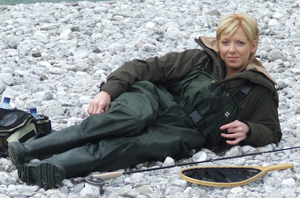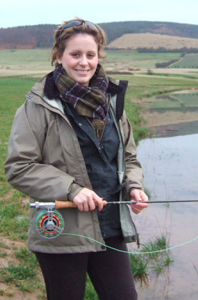(Full version of an article which first appeared in The Herald Saturday magazine in March 2008)
WOMEN have always held a sort of stately presence in the male-dominated world of angling.
Well, both the Queen and her dear old Mum were known to enjoy a spot of salmon fishing now and again. Occasionally a TV celebrity like broadcaster Fiona Armstrong, actress Diana Rigg or entertainer Faith Brown, would emerge as a publicist for the sport or more likely its equipment, pictured waist deep in some swirling water – usually Scottish – and nimbly landing a fish with a stout rod.
But amid the millions of seasoned UK anglers – those legions of ruddy-faced men in oiled jackets, waistcoats and hats bristling with gaudy flies, or beaming into the camera at the back of a small offshore dinghy while struggling to land a mammoth skate – women have mainly been sporting widows.
Their roles have been to pack the lunches, trawl the tackle catalogues at birthday and Christmas times, listen with stifled yawns to tales of ones that got away, or worse, simply wield the filleting knife on ones that didn’t.
But not for much longer. Girls of all ages are demanding a fair share of the fun and finding that not only is fishing relaxing, healthy, entertaining and socially engaging, it can offer them a chance to take on their male counterparts on their home turf, so to speak. And the results suggest that the ladies are more than a match for many men.
The UK record for a rod-caught salmon is still held, as it has been for the past 86 years, by Tay ghillie’s daughter, Georgina Ballantine, a 64lb leviathan caught on the river at Glendelvine. But two other major trophies have recently fallen to the charms of feminine anglers: the British rod record, an immense 66lb catfish, and the women’s British pike record, a 39.5lb monster captured on the Lake of Menteith in Stirlingshire last autumn.
The heroine of that pike catch typifies the new breed of younger feminine enthusiast for whom a cold and windy expanse of river or loch, bewildering tackle selections, skill and stealth in presentation of bait or fly, hold no fears.

“But I was really pleased with how it was received by male anglers as well as women. Sometimes men can just dismiss female success as a bit of luck, but I didn’t hear any comments like that.” She caught another giant 21lb pike the same day and her husband had to help her get the huge specimen fishes into the boat.
Lyn, 33, who first started out fishing for trout ten years ago, now admits it is her number one hobby and the perfect way to relax. “I’d urge any woman to give it a try.” She and her husband, Neil, are back in Scotland this month (March), looking to boost their record pike tally. Neil remarks with a wink: “I am now just her ghillie”.
But not all women have found their entry into the men’s angling world without friction. Glasgow nurse Debbie Johnston launched her Fly Females web site to express concern about the treatment of solo women anglers at trout fisheries in Scotland and has followed this up with new site Reel Backing encouraging everyone to take up the sport.
She says “When I started out I was met with disbelief by some male anglers. I won a competition at a fishery in Ayrshire in 2006 with a bag of 8lb 12oz and many of the congratulations were made through gritted teeth. There have been ignorant stares, and thoughtless comments.”
She says ladies are rarely catered for in terms of clothing or, for example, toilet facilities at many fisheries, and their lowly status prompted her to launch into print online.

“I felt there must be more women out there who wanted to give it a try but were put off by the ‘men only’ thing. Facilities at some fisheries are not geared up for women and we are not considered in tackle and clothing design. ‘Does my bum look big in these waders?’ Yes, of course, because like everything else in fishing they were made for a man,” she observes.
The response she received from women around the world took her by surprise and Debbie, 27, is now launching a new site with broader appeal. She intends that it will include organising women’s days out, and ultimately if she gains the qualifications, casting instruction.
With successful excursions to Alaska and the US behind her, this summer she’s off to Slovenia for the third time with her fiancé for a week’s river fishing. “When we first visited, I was the first female angler to stay in our dedicated fishing hotel. I try not to take it too seriously. If I catch fish that’s fine, but I love the surroundings and the relaxation just as much.”
The evidence is growing that women want their own voice in the world of fishing. Lucy Bowden created her Fishing For Everyone website, just over three years ago while still a schoolgirl. It’s been a huge success and has brought her a clutch of business enterprise awards, worldwide publicity not to mention a recent full-time job as PR co-ordinator for the world renowned fishing tackle manufacturer, Hardy-Greys of Alnwick.
In April 2009 she hosted her first ladies-only day at a Northumberland trout fishery in an effort to evangelise the sport. “There is a huge reservoir of women waiting to be tapped. We have no ladies club in the north-east, although that is something I hope to change very soon.”
She has had inquiries from the length of the country for her open day and is confident of attracting up to 50. “Traditionally women have tended not to go fishing because of family and work commitments. What I want to provide is a girly day without pressure where women can have a little instruction, meet others with similar interests and sample some of the relaxation and social benefits that fishing can bring.”

The appointment of the 21-year-old by Hardy-Greys is a shrewd move by the tackle manufacturer. An estimated 300,000 UK women regularly take part in some form angling whether for trout and salmon, pike or perch, or at sea, generally with husbands and partners. But this is tiny compared with the millions of male regulars that make up the Europe’s largest participant sport with its staggering annual equipment spend worth €25 billion.
Sales of women’s tackle and clothing are as yet immature so keeping in close contact with public interest is a smart move for Hardy’s. In the US, women’s fly-fishing clubs have proliferated in recent years and the skill levels and expertise of the women anglers around the world is growing rapidly.
In March a party of five Scotswomen were flying out to New Zealand to represent their country in the Commonwealth Fly-Fishing Championships.
Team organiser Helen Philp, who has qualified for the Scottish Ladies international team every year for the last 19 years, says: “The youngest member of our party is 28 and the oldest 73. We are completely self-funding and it is costing around £3500 a head to go, so we are very lucky to be able to raise a team. The English ladies haven’t been so fortunate.
“We think it is important if we are to improve our skills to take part in these competitions against world class anglers. We will be fishing on rivers, rather than our usual lochs, and for different species such as grayling compared to our normal trout.”
She says that the younger girls now entering the sport are demonstrating intense commitment and enthusiasm. “They are all exhibiting a real edge for competitive fishing that we have to capitalise on.”
At 23, Elaine McCracken is the youngest member of the senior Scottish ladies fly-fishing team. In 2002 she was the first girl to qualify for the Scottish youth team and explains what has drawn her to angling. “The biggest single attraction is friendships. I have met people from all over the UK and Ireland and made friends that I will never forget.
“Of course there is the excitement of every match and learning new techniques, but it’s the mix of people and the companionship which make it different.” In June she and her team-mates will be out on her home water at the Lake of Menteith pitting their skills against England, Wales and Ireland in this year’s home international.
While interest is growing, some believe that the country’s potential isn’t being tapped. Sheila Mannion, president of the ladies section of the Scottish Anglers National Association, the governing body for game fishing in Scotland, says:
“Interest isn’t really being harnessed. There is no central approach or plan. I spoke to sportscotland at a fishing strategy forum last November to try to persuade them to take some action.
“I would love to see youngsters given casting tuition at school and would be prepared to do it on a voluntary basis. But it needs some central support.”
Scotland hosts just two women-only fly-fishing clubs, though many of the dozens of others covering coarse and sea angling have mixed memberships But it is clear there is scope for development.
Alan McMillan, sportscotland’s angling partnership manager says: “We will be looking into new research on the participation of ladies in angling and are working with other agencies to get more women and girls involved. It will be part of an on-going joint strategy between the Scottish Federation of Coarse Anglers, the Scottish Federation of Sea Anglers and the Scottish Anglers National Association on the development of angling in Scotland.”
There is one Scot who, perhaps more than any other, demonstrates the passion and dedication which a woman can bring to angling. Lesley Crawford is a professional casting instructor, author of three books on trout fishing, as well as a respected commentator and broadcaster. For several years she has successfully run guided wild trout fishing holidays from her home in Caithness.
She avoids being drawn into any sexist debate on the relative merits of men and women anglers, but does think that ladies do possess some attributes which are particularly suited to fishing. These include a generally lighter touch when fly-fishing and the ability to seek out and listen to local advice before starting a fishing expedition.
She says: “Fishing is the most relaxing yet demanding of sports, its unpredictability is its charm and the great escape it offers is hard to beat.” Occasionally ladies catch bigger fish and occasionally they do not, she says.
“We might listen better and have more patience, often we have a defter touch and persevere longer while the men give up and depart to the pub. Hormones however have little or nothing to do with catching fish, that’s up to the individual angler concerned.”
Scotland will be hosting the World Fly-fishing Championships for the first time next summer. There are no women competitors, but few would argue that yet another bastion of male sporting dominance may soon crumble if angling continues to catch on with the girls at its current rate.